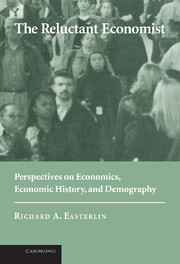Book contents
2 - Economics and the Use of Subjective Testimony
Published online by Cambridge University Press: 03 December 2009
Summary
There is a long and respected history in the social sciences of survey research that elicits subjective testimony (i.e., self-reports) on feelings, beliefs, values, expectations, plans, attitudes, and behavior, including intensive inquiry into possible shortcomings of such data. This extensive body of evidence is unfortunately largely excluded from economic analysis even though economic theory almost invariably includes reference to motivations, expectations, well-being, and the like. The typical economist's view, encapsulated in the concept “behaviorism,” was put succinctly as follows by Victor Fuchs, president of the American Economic Association in 1995: “Economists, as a rule, are not concerned with the internal thought processes of the decision maker or in the rationalizations that the decision maker offers to explain his or her behavior. Economists believe that what people do is more relevant than what they say” (Fuchs 1983, 14, italics in original). As this statement suggests, economists are not apologetic about this dismissal of subjective testimony (note the use of the perjorative “rationalizations” rather than “reasons” in the quotation). On the contrary, they consider it a feather in the discipline's methodological cap (Reder 1999, 294–6). Economic historian Deirdre McCloskey puts the attitude of economists in the following way:
Unlike other social scientists, economists are extremely hostile toward questionnaires and other self-descriptions. … One can literally get an audience of economists to laugh out loud by proposing ironically to send out a questionnaire on some disputed economic point. Economists … are unthinkingly committed to the notion that only the externally observable behavior of actors is admissible evidence in arguments concerning economics.
(McCloskey 1983, 514)- Type
- Chapter
- Information
- The Reluctant EconomistPerspectives on Economics, Economic History, and Demography, pp. 21 - 31Publisher: Cambridge University PressPrint publication year: 2004
- 1
- Cited by



